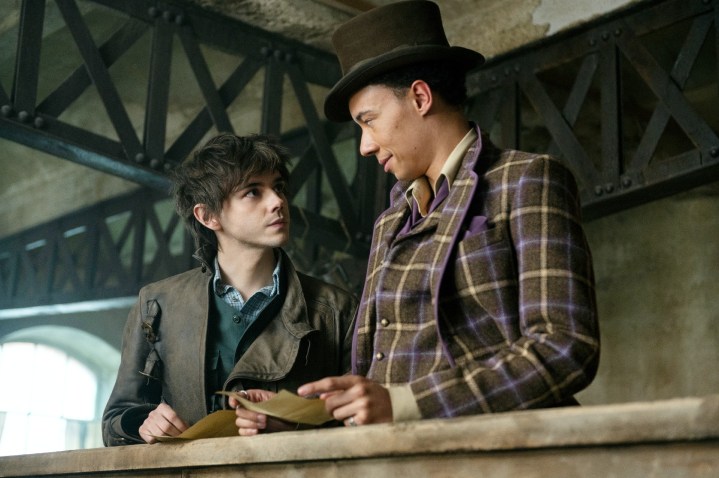At the first glance, The Magic Flute appears to be your regular, run-of-the-mill YA fantasy movie: a young boy with a distinctive scarf goes to a faraway school, where he discovers a magical land filled with snakes, princesses, and yes, a magic flute. The words “Harry” and “Potter” are never uttered, but the movie doesn’t hide its similarities with a certain bespectacled boy wizard.
Yet as soon as the characters start singing — and singing opera arias no less — you realize this movie is quite different than any other fantasy movie out there. In a conversation with Digital Trends, lead actor Jack Wolfe talks about the challenges of starring in a film that’s equal parts fantasy and musical, his love for the fantasy genre, and how his current role as Wylan Hendricks in season 2 of Shadow and Bone differs from his role as Tim in The Magic Flute.

Digital Trends: I talked to Florian [Sigl, the director] earlier, and he mentioned that he chose you to star in The Magic Flute because there are a lot of parallels between you and Tim. How did your own personal experience help you in the film?
Jack Wolfe: I knew of [Mozart’s] opera. It’s such a recognizable piece, and my parents are both musicians, so I had that awareness of it. But … I couldn’t say I was a huge fan. I was a little bit intimidated by it, to be honest. Yeah, I went to study music. Yes, I studied piano and singing. But opera scared me there as well.
It’s funny because Florian is right; there are a lot of similarities between what I went through and what Tim goes through in The Magic Flute. I went to study music at the same time I think Tim did, and it was really challenging. It can be an isolating place, especially for teenagers. So, it’s something I understood really well.
The Magic Flute is a bit of an odd duck because, on the one hand, it’s this Harry Potter-esque fantasy and on the other hand, it’s a musical based on an opera. How did you prep for both the fantasy and musical elements of The Magic Flute?
I mean, the easy answer is that I was consistently terrified by the whole undertaking because it was my debut feature film. And with it also being a special effects-driven fantasy and an opera as well, it felt like a lot to take on all at once. The key for me was getting out of my own head. Florian helped me with that; he’s so calm and focused and he knows exactly what he wants. I could trust him. I was also spoiled by the most incredible cast, which included real opera stars and actors like F. Murray Abraham who have a lot of screen experience. I was able to learn a lot from them.
The opera part didn’t intimidate me as much because I don’t play Tamino in an opera. I play Tim discovering the opera for himself. It was always through the eyes of Tim, who is a novice too. And that was what really helped me take on the challenges of the musical parts of the film. I also had an incredible vocal coach called Sam Kenyon, who got me to a level where I had a workable singing voice for The Magic Flute’s songs. I actually provide the singing voice for Tim in the German version of the film as well. I sing the opera arias in German, which is a nice little Easter egg for everyone out there. [Laughs]

I know you said that this is your first major film, but with all your other credits in television, you’re already becoming something of an expert in the fantasy genre. You’ve appeared on The Witcher and you’re in the second season of Shadow and Bone, which is a huge hit on Netflix. Even though it’s in the same genre, is your approach to Tim in The Magic Flute different than, say, Nadbor in The Witcher and Wylan Hendricks in Shadow and Bone?
Something I really enjoy about the fantasy genre is playing a real person with human feelings who is dealing with things that are completely absurd. That’s such a fun thing to explore. In The Magic Flute, it’s different because Tim exists in the real world, but then he escapes into this fantasy.
In Shadow and Bone, Wylan exists in this made-up world and not in reality. That’s a very different thing from The Magic Flute. But I love the fantasy genre so much. I love the escapism it brings to people. I love learning from fantasy and applying it to real life. I think that’s why people love the fantasy genre and also why people respond to opera. They are both about escapism; they just do it differently.
My hope is that The Magic Flute allows people not only to escape through fantasy and music, but also be inspired to take the enjoyment they get out of the movie and go and support the live art forms like opera and theatre. The film is a great gateway for some people into a genre that I think needs support.
The Magic Flute is currently playing in theaters. Shadow and Bone season 2 is now streaming on Netflix.



